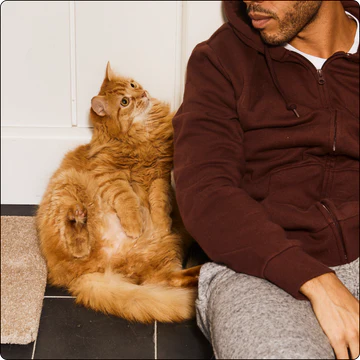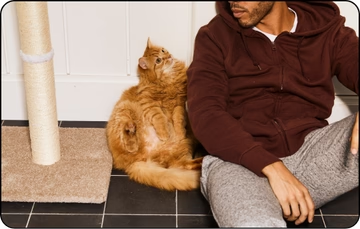Treat your cat's digestive issues and diarrhea from home
Skip the trip and see one of our online vets to get your prescription. Plans start at $11/mo.

- Unlimited vet visits and follow-ups
- Prescriptions delivered free to you
- 100% licensed veterinarians

Causes and treatment for cat diarrhea
Learn why cats get upset stomachs and what to do about it.


Eating something they shouldn’t
Eating something they shouldn’t
If your cat ate something inappropriate, they may experience symptoms like diarrhea, stomach discomfort, vomiting, fatigue, and lack of appetite. It can also lead to pancreatitis. Our online vets can help guide you on what to do.
Diet changes
Diet changes
Switched your cat to a new brand or type of food? This can lead to watery or loose, shapeless stools — especially if you made the change abruptly. You may need to go back to the old food before gradually introducing your feline friend to their new diet.
Food intolerance or allergies
Food intolerance or allergies
Some cats have food sensitivities or allergies, leading to recurrent diarrhea, as well as skin or ear problems. For example, fish, beef, milk, and gluten are difficult for some cats to digest. If you changed your cat’s diet and they don’t adjust to it, they may be sensitive or allergic to one of the ingredients.
Infections and parasites
Infections and parasites
Bacterial infections, like E. coli or salmonella, can cause bloody diarrhea. Raw or undercooked meat is often the culprit, but wet and dry cat food as well as treats could also be the source. If you think your cat may have a bacterial infection, go to a vet as soon as possible. Viral infections and parasites, such as intestinal worms, giardia, and coccidia, can also cause runny cat poop. Our online vets may be able to prescribe cat dewormers if that’s suspected to be the cause.
Other health conditions
Other health conditions
There are a number of diseases that can cause cat diarrhea, including inflammatory bowel disease (IBD), colitis, pancreatic disease, hyperthyroidism, liver disease, and cancer. Stress or anxiety may also cause litter box troubles.
Medicine & treatments for cat diarrhea
Medicine & treatments for cat diarrhea
If your cat is dealing with gastrointestinal issues, we’re here to help. One of our licensed vets can consult with you over video to evaluate your cat’s upset stomach and determine the next steps, which may include prescribing medication that we ship to you at no cost or recommending you go to an in-person veterinarian, if needed.
How Dutch works
-
Pick a plan and become a member
-
Schedule a video call with a licensed vet
-
Order the prescriptions the vet recommends
Frequently asked questions
What can I use Dutch for?
What can I use Dutch for?
With Dutch, you’re never alone when it comes to your pet’s health. Whether your pet needs care or you just have a question, our compassionate and knowledgeable vets are always happy to help.
Here are some ways you can use Dutch:
- Care & prescriptions for over 150 issues
- Behavioral health, nutrition, and exercise advice
- Puppy, kitten, and new pet parent advice
- Preventive care plans
- Night and weekend vet care
- Second opinions & follow-up care after in-person visits
- Advice on whether you need to go to the ER or urgent care
- Vet care when you’re traveling
- Easy prescription refills
- Longevity treatment plans
- Answers to non-urgent questions
What is a visit with Dutch like?
What is a visit with Dutch like?
When booking a video call with a vet, you'll be asked a few questions about your pet’s health issue. Depending on the issue, you may also be asked to fill out a longer questionnaire about their symptoms and share photographs of them so our veterinarians can better understand what’s going on. You’ll then pick an appointment time that works best for you.
During your video call, one of our licensed veterinarians will talk to you about the symptoms your pet is experiencing, ask you questions, review your pet’s medical history if you’ve provided it, and answer any questions you have. The vet will ask to see your pet and their environment. And they may ask you to perform some simple checks on them if needed.
After your video call, the vet will send you a message with a custom treatment plan to help your pet feel better, including a link to buy any recommended prescription or over-the-counter medications. Place your order and we’ll ship it free.
How do I know if you can treat my pet?
How do I know if you can treat my pet?
Our vets can provide care and prescriptions for more than 150 issues — and over 90% of cases can be treated virtually.
The vet can diagnose your pet based on your description of their symptoms, their medical history, seeing them during your video call, and, if needed, through uploaded photos and videos. They may ask you to do a few simple checks during the call. We also offer a number of at-home lab test kits for dogs and cats.
The health and safety of pets is our top priority. In the rare case that a vet determines a pet needs to go to a local clinic, they’ll provide a referral and offer advice on how to care for them until they can be seen.
Some things that require in-person care include emergencies, wounds that need stitches, and issues that require blood work, imaging (X-rays or ultrasounds), or surgery.
Our vets are always available for second opinions and follow-up care after in-person vet visits — so you don’t have to navigate health issues alone.
How much will it cost for Dutch to treat my pet?
How much will it cost for Dutch to treat my pet?
Our memberships are designed to make your pet’s care as easy and affordable as possible. Here’s how your costs will break down:
Membership: You can choose to pay the total price upfront or in 4 installments. All memberships include unlimited care for up to 5 pets at no extra cost.
Vet calls and messaging: No cost — video chat and message with vets as often as you need for free.
Medication: The price will vary depending on your pet’s needs. To keep your costs down, we offer a price-match guarantee, free standard shipping, $25 off your first product order, and 20% off your first flea & tick order.




